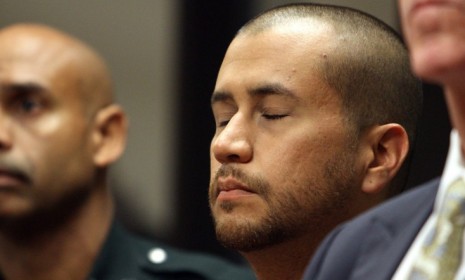Reuters' sympathetic George Zimmerman profile: 7 takeaways
A detailed portrait of Trayvon Martin's killer examines how a string of robberies might have affected his judgment. But does it change the facts of the case?

A free daily email with the biggest news stories of the day – and the best features from TheWeek.com
You are now subscribed
Your newsletter sign-up was successful
There may be more to George Zimmerman, the admitted killer of 17-year-old Trayvon Martin, than you might think. In a lengthy investigative report, Chris Francescani at Reuters sheds light on Zimmerman's multi-racial background and a slew of frightening robberies that occurred in his gated community, Retreat at Twin Lakes in Sanford, Fla., in the months before his fateful encounter with the unarmed black teen. (Zimmerman is charged with second-degree murder, though he claims he was acting in self-defense.) Francescani says his "more nuanced portrait" upends the image of Zimmerman as a "vigilante who had decided Martin was suspicious merely because he was black." Here, seven takeaways from the report:
1. Zimmerman has connections to the black community
The 28-year-old has black roots, through a great-grandfather from Peru. Zimmerman was raised in a racially mixed household, and had close relationships with African Americans as a boy and as a man. In 2004, he started an Allstate insurance franchise with a black friend.
The Week
Escape your echo chamber. Get the facts behind the news, plus analysis from multiple perspectives.

Sign up for The Week's Free Newsletters
From our morning news briefing to a weekly Good News Newsletter, get the best of The Week delivered directly to your inbox.
From our morning news briefing to a weekly Good News Newsletter, get the best of The Week delivered directly to your inbox.
2. His neighborhood had been hit by a string of robberies
Florida's housing market was devastated by the Great Recession, and in Zimmerman's neighborhood, housing prices plummeted. The "family-friendly, first-time homeowner community" at Retreat at Twin Lakes soon turned into a haven for transient renters. In the 14 months prior to Martin's death, Retreat at Twin Lakes experienced at least eight robberies, according to Sanford authorities. However, residents say there were dozens of attempted break-ins and "would-be burglars casing homes," creating "an atmosphere of growing fear."
3. Neighbors blamed black men for the rise in crime
Witnesses say the suspects in the robberies were mostly young black men. "There were black boys robbing houses in this neighborhood," an unidentified black resident tells Reuters. "That's why George was suspicious of Trayvon Martin."
A free daily email with the biggest news stories of the day – and the best features from TheWeek.com
4. Zimmerman was unsettled by an August 2011 break-in
"It was the August incursion into the home of Olivia Bertalan that really troubled the neighborhood, particularly Zimmerman," says Francescani. Two black men allegedly slipped into Bertalan's house while she was home alone with her baby son. She locked herself in the boy's room and phoned the police, while the robbers reportedly attempted to steal her television. Police arrived as the would-be burglars escaped out the back door, and Zimmerman's wife, Shellie Zimmerman, saw a black male teen sprinting across her backyard. A month later, Zimmerman agreed to head a new neighborhood watch.
5. He reported a suspicious black teen in early February
Weeks before he killed Martin, Zimmerman called Sanford police after he saw a black teen looking through the windows of a neighbor's empty home. "I don't want to approach him, personally," Zimmerman said in the recorded call. The police came, but the suspect had already left. Days later, another home was robbed, and police arrested 18-year-old Emmanuel Burgess, who was reportedly the same suspicious person Zimmerman had seen earlier. Francescani says Zimmerman "was not so patient" the next time he reported a "suspicious" person — the night he encountered Martin.
6. Zimmerman bought his gun to ward off dogs
Zimmerman received firearms training and bought a gun in 2009, after a police officer said it would be the best way to deal with a pit bull that was menacing the community. Zimmerman later brought the gun with him on his patrols around Retreat at Twin Lakes, a violation of neighborhood watch guidelines, but not a crime.
7. Reaction to the story has been mixed
The report gives us "some glimmering of what might have been in the mind of George Zimmerman the night he and Martin crossed their unfortunate paths," says Russ Vaugn at American Thinker. "For those of you quick to condemn Zimmerman, it may well give you some pause." Perhaps, but "the fact remains that George Zimmerman took an innocent life," says BoomanTribune. And "police didn't properly investigate the incident."
-
 6 exquisite homes with vast acreage
6 exquisite homes with vast acreageFeature Featuring an off-the-grid contemporary home in New Mexico and lakefront farmhouse in Massachusetts
-
 Film reviews: ‘Wuthering Heights,’ ‘Good Luck, Have Fun, Don’t Die,’ and ‘Sirat’
Film reviews: ‘Wuthering Heights,’ ‘Good Luck, Have Fun, Don’t Die,’ and ‘Sirat’Feature An inconvenient love torments a would-be couple, a gonzo time traveler seeks to save humanity from AI, and a father’s desperate search goes deeply sideways
-
 Political cartoons for February 16
Political cartoons for February 16Cartoons Monday’s political cartoons include President's Day, a valentine from the Epstein files, and more